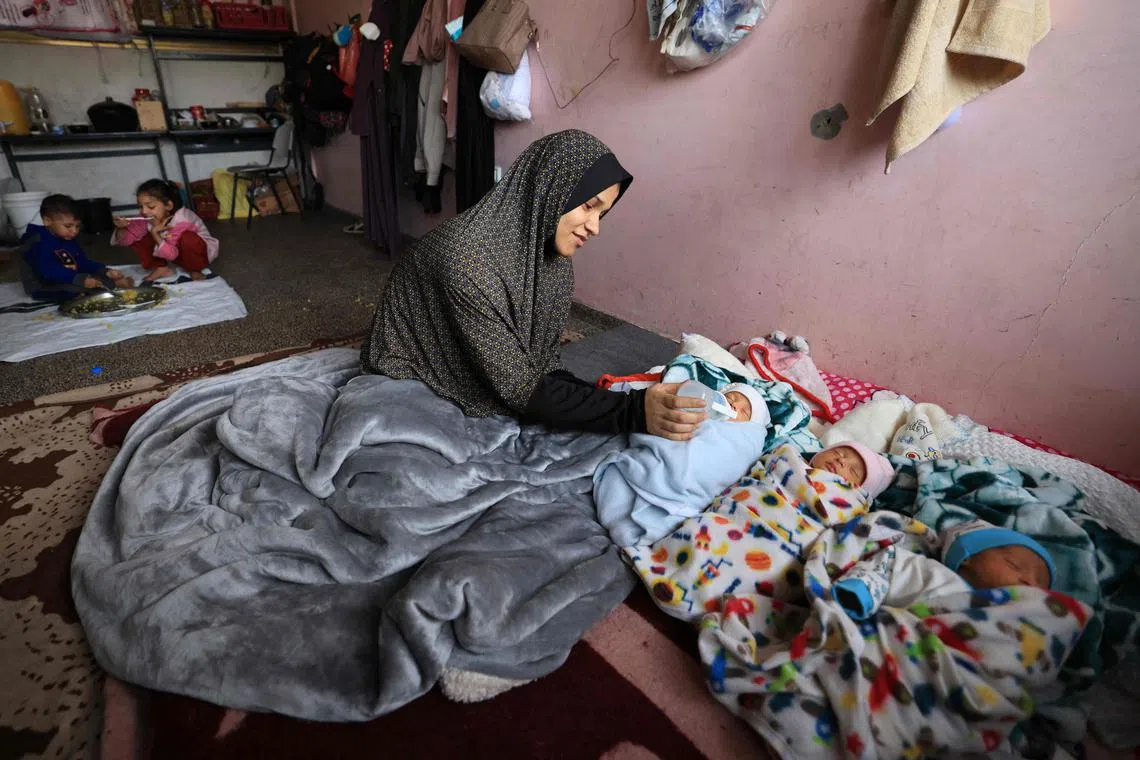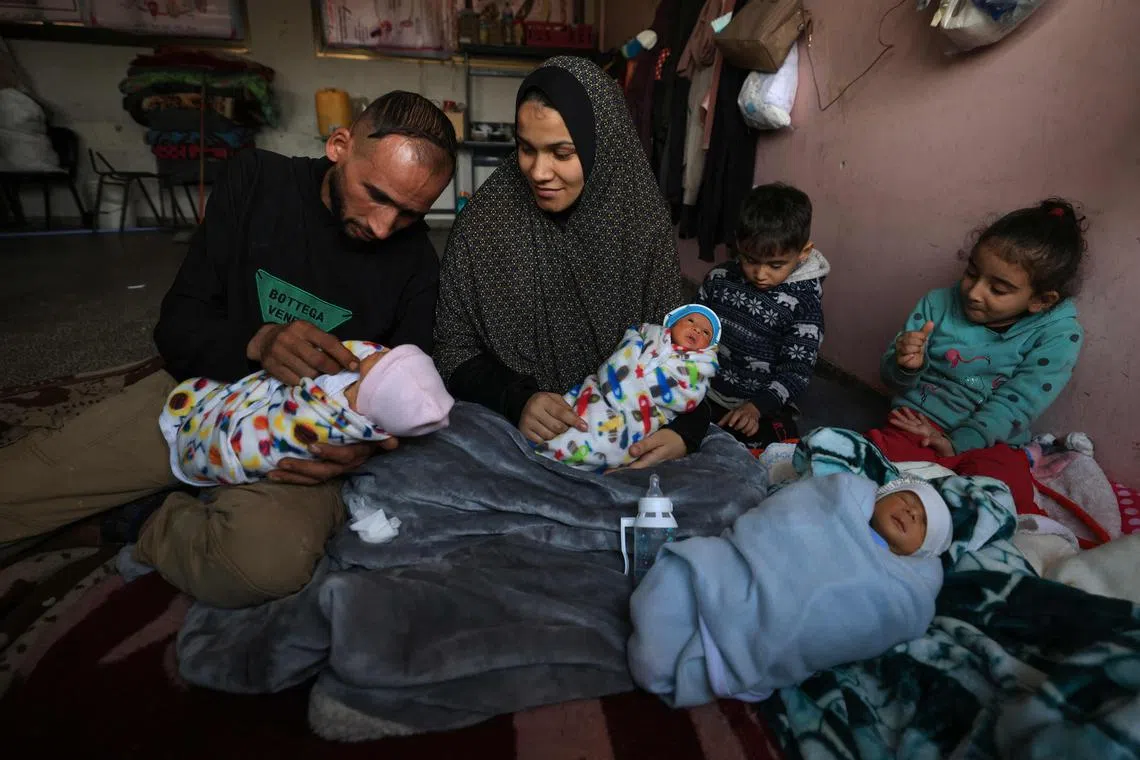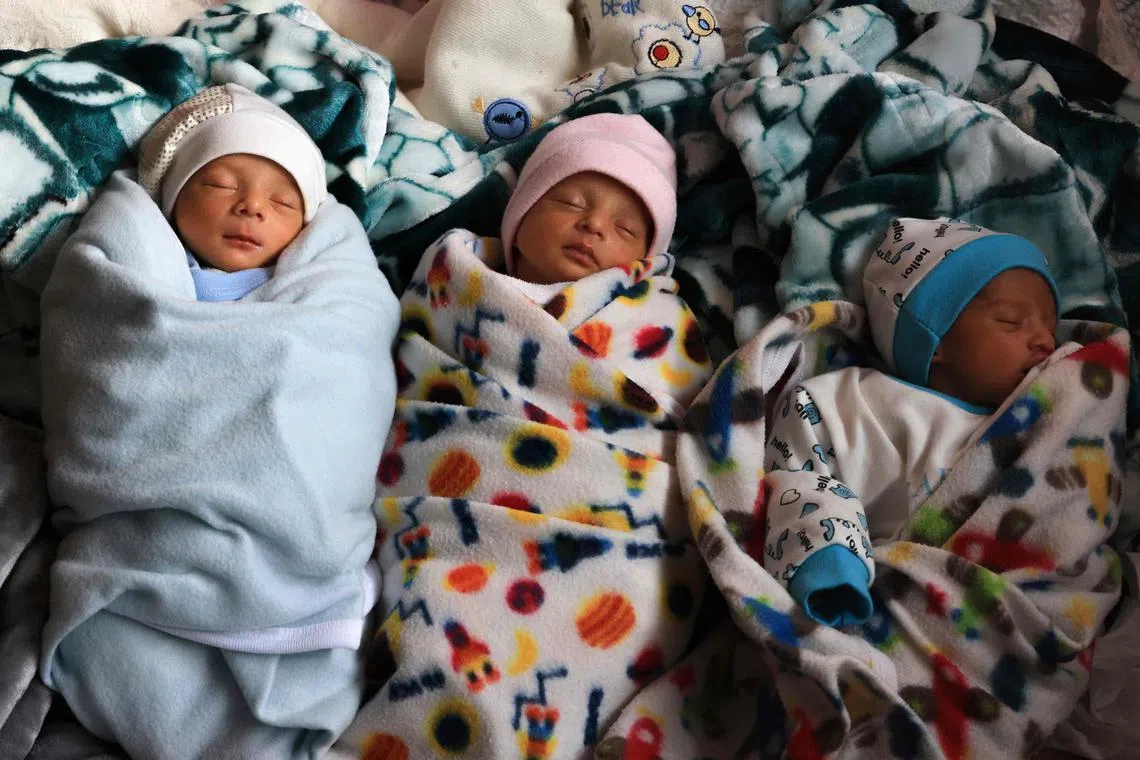Displaced by war, Gaza mother gives birth to quadruplets
Sign up now: Get ST's newsletters delivered to your inbox

Ms Iman al-Masry gave birth by C-section on Dec 18 to daughters Tia and Lynn and sons Yasser and Mohammed. But she had to leave Mohammed behind at a hospital, as he was born weighing just 1kg.
PHOTO: AFP
Follow topic:
DEIR AL-BALAH, Palestinian Territories - Ms Iman al-Masry is simply exhausted after giving birth to quadruplets at a hospital in southern Gaza, miles away from her home in the north of the war-torn Palestinian territory.
Days into the Israel-Hamas war, sparked by Hamas’ Oct 7 attack on Israel,
They walked 5km to the Jabalia refugee camp, looking for a means of transport that would take them to Deir al-Balah further south.
Ms Iman was six months pregnant and “the distance was too long”, she told AFP.
“It affected my pregnancy,” added the 28-year-old mother, who gave birth by caesarean section on Dec 18 to daughters Tia and Lynn and sons Yasser and Mohammed.
But Ms Iman was quickly asked to leave the hospital with the newborns – minus Mohammed, who was too fragile to go with them – to make room for other patients of the war.
Now, they live in a cramped schoolroom-turned-shelter in Deir al-Balah, along with around 50 other members of their extended family.
“Mohammed weighs only 1kg. He cannot survive,” Ms Iman said of the child she left behind at a hospital in the Nusseirat refugee camp.
Lying on a foam mattress in the schoolroom-turned-shelter, she recounted her journey from hell.
“When I left home, I had only some summer clothes for the children. I thought the war would last a week or two, and that afterwards we would go back home,” she said.
More than 11 weeks later, her hopes of ever returning home are shattered.
The Gaza Strip, home to 2.3 million people, lies in ruins from the north to the south. According to United Nations estimates, the fighting has displaced 1.9 million Palestinians internally.

Mr Ammar al-Masry and his wife Iman fled their home with their children to escape Israeli bombardment, and now live in a cramped schoolroom in Deir al-Balah along with around 50 other members of their extended family.
PHOTO: AFP
The conflict erupted when Hamas gunmen attacked southern Israel, resulting in the deaths of about 1,140 people, mostly civilians, according to an AFP tally based on Israeli figures.
Palestinian militants also took around 250 hostages, 129 of whom remain in captivity, Israel says.
Israel retaliated with a relentless bombardment and siege of Gaza, followed by a ground invasion from Oct 27.
The campaign has killed at least 21,110 people, according to the latest toll issued by Gaza’s Health Ministry, about two-thirds of them women and children.
‘Helpless’
Like other mothers, Ms Iman had hoped to follow tradition and celebrate the birth of her babies by “dousing them with rose water”.
But 10 days on, “we have not even been able to bathe them”, she said, because of the difficulty of finding clear water in the devastated territory, where there is a dire shortage of basic food, including milk, medicine and hygiene supplies such as diapers.
“Normally, I would change babies’ diapers every two hours. But the situation is difficult and I must be thrifty,” she said, adding that the newborns get a fresh diaper only in the morning and another in the evening.

Three of the al-Masry quadruplets. The fourth, Mohammed, is still being treated in hospital.
PHOTO: AFP
Her husband, Mr Ammar al-Masry, 33, said he is devastated because he cannot provide for his family.
“I feel helpless,” he said, surrounded by his six children in the foul-smelling schoolroom.
“I fear for my children. I don’t know how to protect them,” he said, adding that he spends most of his days outdoors searching for food.
“Tia, who has jaundice, must be breastfed, and my wife needs nutritious food that contains protein. The children need milk and diapers. But I cannot get any of that.” AFP

